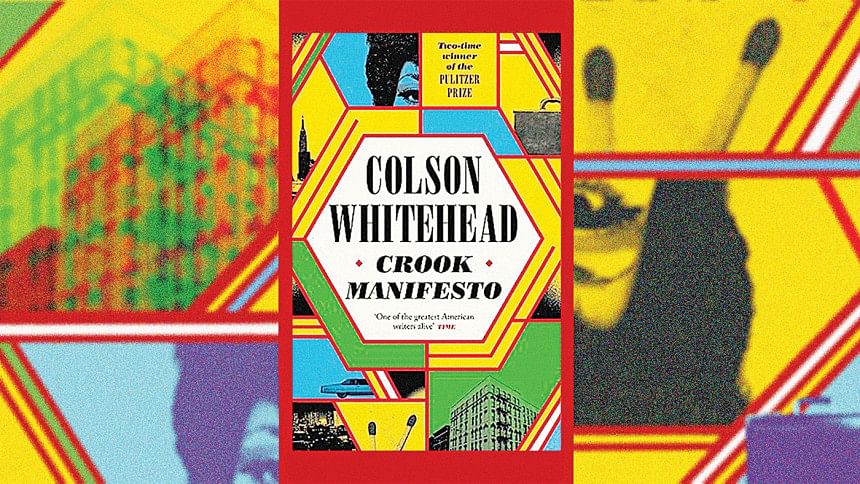The straight and narrow vision of ‘Crook Manifesto’

Colson Whitehead's sequel to his novel Harlem Shuffle (Doubleday, 2021) is a continuation of the exact same order. From its structure (three loosely connected novellas encompassing a decade in New York City) to its pastiches of crime, noir, and heist fiction, Whitehead's Harlem saga reads as if one came after the other through a conveyor belt. That if there is to be a third one, it would be of exactly similar dimensions. There would be little cause for complaints, though, as Whitehead's delicious prose is worth a view in abundance.
Colson Whitehead came to prominence with The Underground Railroad (Doubleday, 2016), a riveting piece of speculative fiction, ingenious and movingly narrated, where the secret network through which slaves escaped to freedom in Antebellum America was re-imagined as a literal underground train network. He followed it up with The Nickel Boys (Doubleday, 2019), a fictional account of the Dozier School, a highly abusive reform school. Both novels won the Pulitzer, ushering Whitehead into a much deserved superstardom. A gifted writer of genre fiction, he set himself apart from the 2000s era tendency of literary writers to co-opt the field for themselves with sub-par detective fiction and soft sci-fi.
In Crook Manifesto and its predecessor Harlem Shuffle, Whitehead tells the story of Ray Carney, owner of a furniture business, who occasionally partakes in fencing. He comes from a family who dabbled in crime, but wants to live a life now in the "straight and narrow," which he fails time and time again. Crook Manifesto finds him in the 1970s of The Jackson Five, The Black Panthers, and Blaxploitation films, a time Whitehead describes with intimate specificity. His New York City is, the reader realises, the real villain here. A city that breathes and spreads criminal activity, a city colourfully perfect for the movies.
And the screen really is the true influence here. Crook Manifesto and Harlem Shuffle are both products of the best of crime and noir that TV offered us in the new millennium. It is not American counterculture of the 60s and 70s, nor the seedy underbellies of crime capitals that truly seemed to motivate the book, though it copiously uses these material as plot, but rather, it is the exhausting golden generation of TV that Whitehead's series of novels most resemble. Whitehead provides a succinct comparison himself: "Filmmaking was a heist, same animal…Everybody's got their special role, following the script. One guy to punch out the safe, another at the wheel…"
His evenly sectioned, anthological tributes to the genre operate the exact same way high-budget streaming shows on crime and race aired at the tail end of the 2010s. And like these shows, some episodes end up uneven while others try the patience of their audience. In the first section of Crook Manifesto, we find Ray Carney trying to procure tickets to a Jackson Five concert for his daughter, a seemingly innocent endeavour that throws him back deep into the world of crime. By the end of the episode, we see him deeply mired in the treachery and violence of police corruption.
The abrasive story is skillfully handled. Colson Whitehead's comedy is a constant hit throughout the book and makes up for much of the bloat present in the latter two sections. (As Ray wonders about the excuse he would have to give to his family for getting socked by a cop, he thinks of his mother-in-law, Alma: "He was going with mugged, given the state of the city these days. If Alma were still alive, he'd have picked a mugging location to irritate her—in front of her church, in broad daylight…" In the second section, too, which sees Ray's furniture store being used for a film, we are treated to hilarious set-pieces such as "A black crime fighter named the Red Conk, who gains superpowers after applying radioactive hair straightener. He has various adventures until he gets lynched by Super Cracker for using his X-ray vision on a white lady.")
It is true that Crook Manifesto is too dense for its own good. In sampling and satirising the hard-boiled genre, it stops short from being clean-cut itself. Yet, at the same time, Whitehead's book is not experimental. It is a straight-up meditation on crime fiction. Ray Carney may fault himself for slipping. "Crooked stays crooked," he says, "and bent hates straight." But Colson Whitehead achieves in novelistic style what Carney can't in his life. He stays out of trouble.
Shahriar Shaams has written for Third Lane, Singapore Unbound, Six Seasons Review, Arts & Letters, and Jamini. He is nonfiction editor at Clinch, a martial-arts themed literary journal. Find him on twitter @shahriarshaams.

 For all latest news, follow The Daily Star's Google News channel.
For all latest news, follow The Daily Star's Google News channel. 








Comments